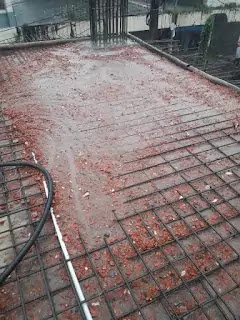Construction during rainy season. How does wet weather affect construction?
If it rains during casting, problems that may occur: –
The strength is directly depends on the quality of concrete. Which largely depends on the ratio of water to cement. Mixing in the right proportions and using in the right time ensures the strength of the concrete.
When mixing concrete on a rainy day, rainwater mixes with the concrete in an unintentional manner, increasing the amount of water in the cement to the water ratio of the concrete. Granted, this should always be done in such a way that the required amount of water is not mixed in the concrete.
Problems that occur when excess water is used in concrete during pouring of concrete, or if excess water is mixed in any way: –
1. If the amount of water in the concrete increases, there may be bleeding in the concrete (cement coming out of the water with water through any place) which weakens the concrete by creating lack of cement in the concrete.
2. If there is any hole in the shuttering, and if rain water falls in any way before the concrete is solidified, the cement will come out in the shuttering hole with the water.
3. Excess water in the concrete causes the cement to float on top of the concrete with water, which creates a cement deficit in the concrete, which can also cause cracks in the concrete after the concrete has solidified.
4. Slow down the solidification of concrete.
5. If it rains before the concrete solidifies, the raindrops will create unevenness on the concrete surface.
Excessive rainfall often creates wounds on the concrete surface, which creates problems with the strength of the concrete and the covering of the rod.

